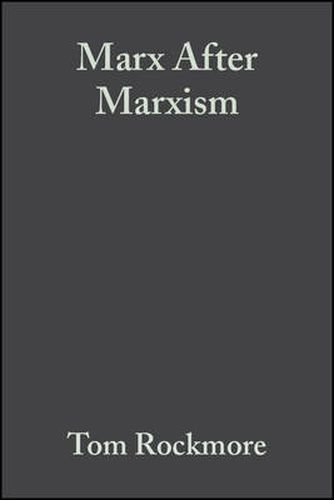Readings Newsletter
Become a Readings Member to make your shopping experience even easier.
Sign in or sign up for free!
You’re not far away from qualifying for FREE standard shipping within Australia
You’ve qualified for FREE standard shipping within Australia
The cart is loading…






Marx After Marxism encourages readers to understand Karl Marx in new ways, unencumbered by political Marxist interpretations that have long dominated the discussions of both Marxists and non-Marxists. This volume gives a broad and accessible account of Marx’s philosophy and emphasizes his relationship to Hegel. Marxism has always claimed and still claims a privileged relation to Marx’s theories. It typically presents a view of Marx that is widely accepted by Marxists, non-Marxists, and even anti-Marxists, unfortunately without careful scrutiny. This book argues that political Marxist influence obscures, transforms, distorts, and renders inaccessible Marx’s basic philosophical insights. It concentrates on recovering Marx’s philosophical ideas not in opposition to, but rather within, the larger Hegelian framework. Now that we have seen the end of political Marxism’s peak global influence, it is possible, for perhaps the first time, to depict Marx as a philosopher who began to think within, and remained within, the German philosophical tradition.
$9.00 standard shipping within Australia
FREE standard shipping within Australia for orders over $100.00
Express & International shipping calculated at checkout
Marx After Marxism encourages readers to understand Karl Marx in new ways, unencumbered by political Marxist interpretations that have long dominated the discussions of both Marxists and non-Marxists. This volume gives a broad and accessible account of Marx’s philosophy and emphasizes his relationship to Hegel. Marxism has always claimed and still claims a privileged relation to Marx’s theories. It typically presents a view of Marx that is widely accepted by Marxists, non-Marxists, and even anti-Marxists, unfortunately without careful scrutiny. This book argues that political Marxist influence obscures, transforms, distorts, and renders inaccessible Marx’s basic philosophical insights. It concentrates on recovering Marx’s philosophical ideas not in opposition to, but rather within, the larger Hegelian framework. Now that we have seen the end of political Marxism’s peak global influence, it is possible, for perhaps the first time, to depict Marx as a philosopher who began to think within, and remained within, the German philosophical tradition.